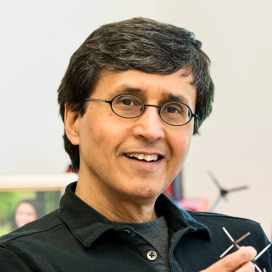Viresh Rawal was born in India, and at a young age immigrated with his family to the United States, settling in Connecticut. He received his BS degree from the University of Connecticut (1980) and his PhD from the University of Pennsylvania (1986) under Professor Michael Cava. After postdoctoral work with Professor Gilbert Stork (Columbia University), he commenced his independent career at Ohio State University in 1988 and was promoted to Associate Professor in 1994. He relocated to the University of Chicago in 1995 and in 1998 was promoted to the rank of Professor. He served as Chair of the Chemistry Department from 2015-2018, and 2021-2023.
Rawal’s research program covers a broad range of problems in organic synthesis, with an emphasis on the development of methods and strategies for complex molecule synthesis. The effort in total synthesis has culminated in the completion of numerous intricate targets, including (-)-isocomene, modhephene, silphiperfol-6-ene, (+)-tabersonine, (-)-quebrachamine, vindoline, arborescidines A-C, (+)-geissoschizine, dehydrotubifoline, akuammicine, zenkerene, elisapterosin B, elisabethin, mycalamides A and B, pederin, platencin, welwitindolinones B, C, and D, ambiguines G, P, Q, heilonine, hinckdentine A, and strychnine (two routes). Methodology development has played a central role in his work and considerable effort has been devoted to the development of transition metal catalysis of reactions, including enantioselective reactions. His group has also made pioneering contributions to organic catalysis using hydrogen bond donors, including the first demonstration of simple chiral alcohols serving as highly enantioselective catalysts. Their development of chiral squaramides, which are bifunctional hydrogen bond donor catalysts, represented a major advance in organocatalysis, and are among the most widely used catalysts for asymmetric synthesis.
Rawal has delivered over 300 plenary and invited lectures and his work has been recognized through awards, including the ACS Award for Creative Work in Organic Synthesis (2024), International Society of Heterocyclic Chemistry E.C. Taylor Award (2022), CRSI Medal (2019), Japan Society for the Promotion of Science Lectureship (2015), Novartis International Lectureship Award (2015), ACS Cope Scholar Award (2003), Swiss Chemical Society Lectureship Award (2002), and awards from Pfizer, Merck, and Eli Lilly (1995-1998). He has served on the editorial boards of The Journal of Organic Chemistry (2004-2008), Organic Syntheses (2007-2015), Heterocycles (2007-2023), Organic & Biomolecular Chemistry (2012-present), Organic Chemistry Frontiers and Asian Journal of Organic Chemistry (2012-2020), and Tetrahedron and Tetrahedron Letters (2015-present). He served as the Editor for Science of Synthesis, Volume 46, “Compounds with All-Carbon Functions, 1,3-dienes.”
